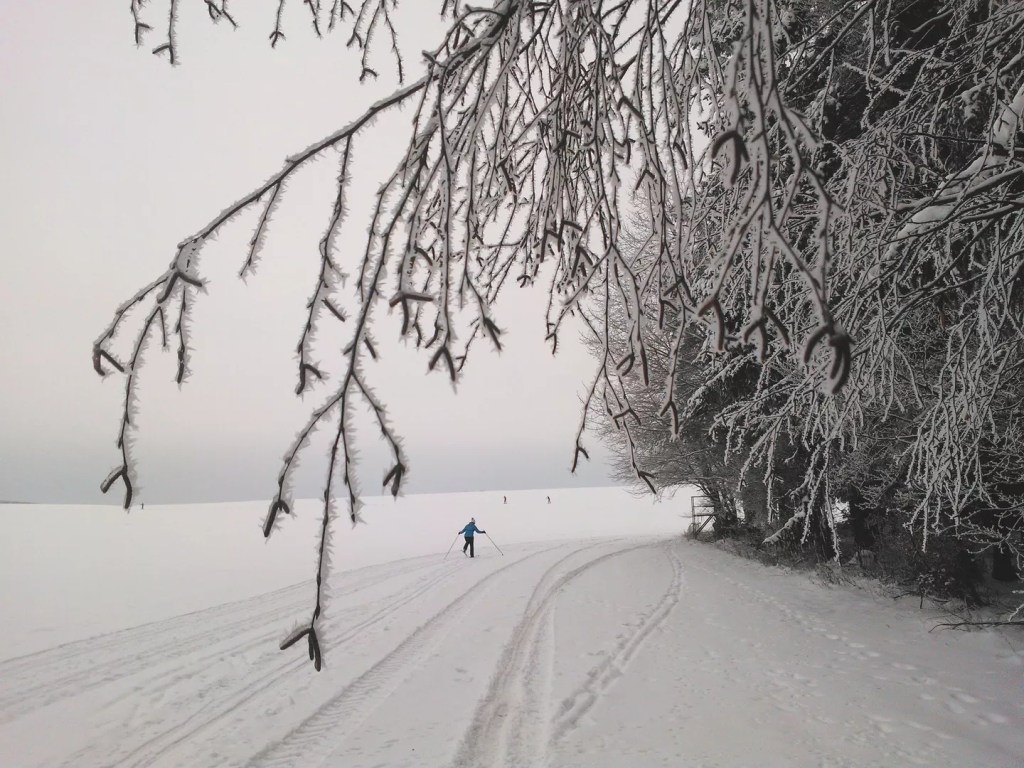Shortly after noon on February 22, environmentalists from the Capitol District to New York City converged in New Paltz before the regional office of the New York State Department of Environmental Conservation (DEC). The rally, organized by local residents and supported by organizations like Mid-Hudson Sierra Club and New York Lawyers for the Public Interest, marked the conclusion of public comments to the DEC on the proposed expansion of the Iroquois fracked gas pipeline.
Rally co-organizer Charles Quimby, a resident of the Dutchess County town of Dover, and member of Concerned Citizens of Dover, describes the delivery of more than 3,000 comments against the expansion of the Iroquois pipeline as part of a years-long educational campaign.
“Most people have just no idea of these projects, what happens and how it happens, because it’s sort of different from other projects that are proposed at a town level,” says Quimby, distinguishing between local developments that are regulated by municipalities and interstate projects like the Iroquois pipeline, which are regulated by federal and state governments. “This is kind of going above that, so we’ve done a lot of work to make people aware.”
Awareness may be where opposition to Iroquois starts, but should the DEC ignore their comments and approve the pipeline’s expansion, residents like Quimby and their allies are preparing for legal action. It’s necessary, opponents say, to prevent Iroquois from further packing the “time bomb” that they planted underground 30 years ago.
“Plan B is to Go with Expanding”
As it stands, the Iroquois pipeline snakes nearly 400 miles from the US-Canadian border at Waddington, New York, to Devon, Connecticut, where it crosses the Long Island Sound, then splits between New York City and Long Island. Along the way, fracked gas within the pipeline is propelled by compressor stations, such as the two in New York, at Athens and Dover, and two in Connecticut, at Brookfield and Milford.
In February 2020, Iroquois submitted permit applications to the DEC to increase the power of the compressor stations at Athens and Dover, adding 125 million cubic feet of gas per day to the 575 million already flowing through the pipeline.
“The firm natural gas interstate pipeline capacity currently available into the New York metro region is extremely limited,” says Ruth Parkins, manager of corporate communications and public relations at Iroquois. “As such, the ‘Enhancement by Compression’ Project will support such reliability and resilience during the clean energy transition.”
Although Iroquois dubs the project an “enhancement,” critics describe that as a ruse meant to avoid popular opposition to the construction of new pipelines, such as the movement against the Dakota Access Pipeline in 2016 and ‘17.
“I think these pipeline companies have realized that their chances of getting a pipeline passed are pretty slim, so their plan B is to go with expanding what they have—increasing the pressure, increasing the flow in those existing pipelines,” says Quimby.
With regard to Iroquois’s justification for its pipeline expansion, critics also see a ruse. When the company first applied to the Federal Energy Regulatory Commission (FERC) to expand the pipeline in 2020, its justification rested on growing demand, especially in New York City. In 2021, however, legislators in New York passed a law prohibiting new residential construction from installing gas hook-ups beginning later this year. Then, in 2022, New York State Governor Kathy Hochul proposed legislation that would prohibit new gas hooks-ups within five years.
“Iroquois has stated that there’s a need downstate, but it just does not add up,” says Quimby.

“It Sounds like an Explosion”
Whether an “expansion” or an “enhancement” is necessary, opponents nevertheless fear the consequences of Iroquois increasing its delivery of fracked gas. Marketed as “natural gas,” a “clean” alternative to home heating oil, fracked gas is in fact primarily methane, a far more potent greenhouse gas and contributor to climate change than carbon dioxide.
As a greenhouse gas, methane is one of the emissions considered in Iroquois’s application to the FERC, which the company was required to appeal to prior to the DEC. Although the FERC approved the application in 2022, the Environmental Protection Agency criticized Iroquois for essentially low-balling its estimates of greenhouse gas production. In a letter to FERC Secretary Kimbery Bose, EPA Administrator Vicki Arroyo wrote that Iroquois’s application “inadequately discloses the estimated climate damages of greenhouse gas emissions” and that the commission should postpone its decision.
FERC failed to respond to multiple requests for comment from The River.
On a more local level, those living around compressor stations, like Quimby in Dover, are concerned about other emissions too. Compressor stations maintain the pressure of fracked gas flowing through pipelines by both burning and releasing gas.
“When there’s too much pressure in the pipelines, there’s ‘blowdowns,’” explains Quimby. “It sounds like an explosion, where they release the pressure, and with that comes methane and other harmful chemicals and gasses and particulates.”
Research suggests that residents of Athens, Dover, Brookfield, Milford, and other compressor station sites are justified in their concern. A compendium of research published by Physicians for Social Responsibility connects compressor stations to the production of 70 different air pollutants—39 of which are linked to cancer.
“A Time Bomb Underground”
“The ‘Enhancement by Compression’ Project will be constructed and operated in a manner that is in compliance with all federal and state safety regulations governing the ongoing operation of the Iroquois pipeline system,” says Iroquois’s Parkins. “During its 30-plus years of operation, Iroquois has consistently made safe and reliable operations its top priority as evidenced by its excellent operating record.”
Despite assurances from Iroquois, concerns with its pipeline are not limited to the present, with ongoing emissions, or the future, from the potential expansion, but the past too. The existing pipeline was constructed in 1991 and ‘92. Just four years later, in 1996, Iroquois was fined $22 million by the federal government following an investigation into the pipeline’s construction.
According to an EPA press release from the time, Iroquois admitted to “knowingly violating a number of environmental and safety provisions” while constructing the pipeline. This involved not only damaging nearly 200 neighboring wetlands and streams, but improperly backfilling the pipeline’s trench with stones that could rupture the line, as opposed to using soil, as mandated by the US Army Corps of Engineers.
Although the EPA touted that the fine levied on Iroquois was the second largest in US history, trumped only by the Exxon Valdez oil spill in 1989, contemporary news coverage was less celebratory. According to an article from The New York Times, “After years of assertions by critics that Iroquois had rushed in construction, leaving the pipe as a time bomb underground, the safety questions were not resolved by the court action today.”
Indeed, those questions of safety are still pressing on people who live along the pipeline, like Quimby, to whom the prospect of cranking up the pressure of explosive gas in a potentially ruptured pipeline could seem like a recipe for a pipe bomb.
“We have concerns about the increased pressure in this pipeline that runs through, bisects our town,” says Quimby. “Increasing the pressure in this pipeline to its near limit, near maximum operating pressure limit, we feel is very dangerous.”
“Cannot and Should Not Move Forward”
With the public comment period on the Iroquois expansion concluding last month, the DEC is anticipated to make its decision on the pipeline’s permit by April 11. Although organizers like Quimby are proud of the number of comments they’ve been able to turn out against the expansion, they aren’t resting on their laurels. In the lead-up to DEC’s decision, Quimby and fellow organizers, like Mary Finneran of the Mid-Hudson Sierra Club, are planning another rally on April 4, this time in Albany, as well as a campaign to flood Governor Hochul’s office with postcards against the expansion.
For its part, DEC has stated that the department “will consider all public comments, along with compliance with all relevant requirements, including those under the ‘Climate Act,’ prior to making a decision,” says Jeff Wernick, assistant public information officer, in reference to the Climate Leadership and Community Protection Act, signed by former Governor Andrew Cuomo in 2019.
Legal advocates against the Iroquois expansion also see the CLCPA as a potential lynchpin, along with the Environmental Rights Amendment, approved by statewide referendum in 2021.
“The Climate Leadership and Community Protection Act, New York’s Climate Law, mandates emissions reductions and protection of disadvantaged communities,” says Sonya Chung, staff attorney at New York Lawyers for the Public Interest, which issued a letter to the DEC urging it to deny Iroquois’s permit last month. “On both points, the gas pipeline expansion cannot and should not move forward. New Yorkers also now have the protection of the Environmental Rights Amendment that ensures every New Yorker’s right to clean water, clean air, and a healthy environment. Expanding and creating longer dependency on the fossil fuel industry—an industry that is driving the climate crisis and all the resulting harmful impacts on environmental justice communities — is a violation of that right.”
And if the legislation itself isn’t enough to bring the DEC to reject Iroquois’s application, it may provide grounds to challenge any approval. “Whenever an agency fails to perform its legal duties, makes an unlawful decision, or acts in a way that is arbitrary or unsupported by evidence, New Yorkers who are harmed by that action have the ability to challenge that agency action in court,” says Chung. “If NYS DEC grants the permit for Iroquois expansion, those who would be harmed by that decision—folks like Dover residents and communities along the pipeline—could potentially challenge the permit approvals for violating laws like the CLCPA and the ERA.”
For Dover residents like Quimby, if the Iroquois application is accepted, it isn’t a question of whether they’ll be harmed—or whether they’ll challenge the permits.
“We would challenge the DEC’s decision,” says Quimby. “We wouldn’t just accept the decision if it were not a complete rejection.”
This article appears in March 2023.














